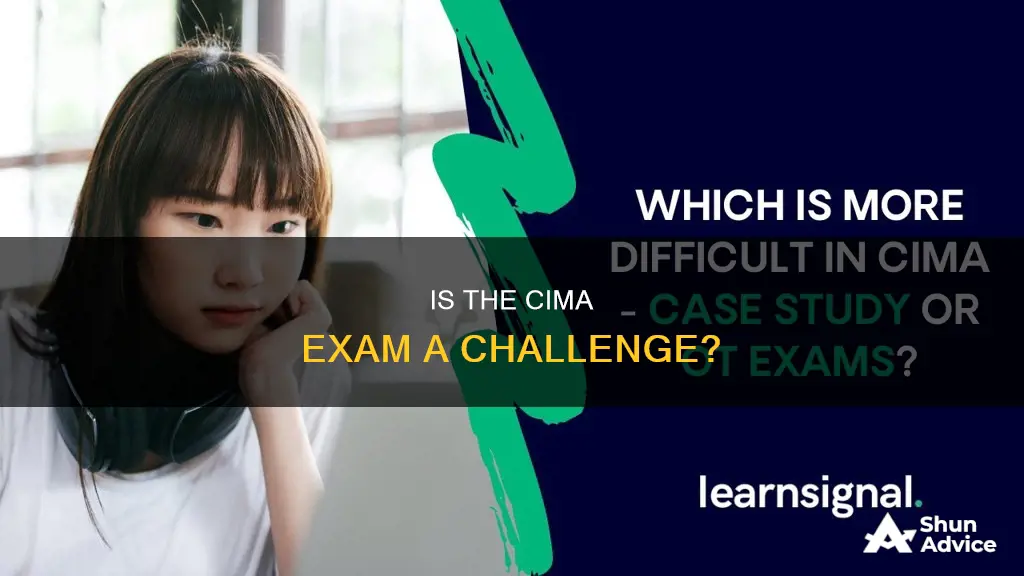
The Certified Investment Management Analyst (CIMA) is a challenging but rewarding certification for financial professionals. Issued by the Investments and Wealth Institute, the CIMA is designed for financial professionals who want to become advanced investment consultants. The program covers topics such as risk measurement, asset allocation, due diligence, and investment policy. Candidates must meet rigorous education, experience, and exam requirements to earn the designation. They must have at least three years of financial services experience and a clean regulatory record. The exam consists of 140 multiple-choice questions covering various topics, including business, economic, governance, and statistical fundamentals. With its focus on practical knowledge and investment theory, the CIMA provides advisors with the tools to go beyond investment fundamentals and offer sophisticated advice to high-net-worth clients.
| Characteristics | Values |
|---|---|
| Difficulty | Rigorous |
| Prerequisites | 3 years of financial services experience, a satisfactory record of ethical conduct, and passing an initial background check |
| Training | Executive education course through an approved registered education provider |
| Exam Type | Closed book, proctored final certification exam, online or in person |
| Topics Covered | Risk measurement, asset allocation, due diligence, investment policy, portfolio performance, portfolio theory, and behavioural finance |
| Time Commitment | 9-12 months |
| Pass Rate | Fewer than 4 out of 10 candidates pass |
| Continuing Education Requirements | 40 hours every two years, with at least 2 hours relating to ethics |
What You'll Learn

CIMA education requirements
The CIMA (Certified Investment Management Analyst) certification is offered by the Investments and Wealth Institute (IWI), a professional association, standards body for finance professionals, and advanced education provider. The IWI is focused on excellence, ethical practice, and real-world application in the investment industry.
The CIMA certification is the only financial services designation to be accredited by the American National Standards Institute. The process of becoming a CIMA certificate-holder is rigorous but rewarding and can help elevate your investment career.
To become a CIMA certificate-holder, there are several key steps to earning and maintaining your certification. Firstly, you must submit an application (including a fee) to the IWI. Following this, candidates will usually hear back from the IWI regarding official acceptance into the program within 10 business days.
The next step is to complete an approved executive education program from one of the following institutions: Yale, the University of Chicago, the University of Pennsylvania, or the Portfolio Construction Forum. The course format varies by provider, but all programs integrate practical knowledge with investment theory, including advanced portfolio construction, accounting, and risk management.
Once you have completed the executive education program, you must sit for and pass the CIMA certification exam. This is a closed-book, proctored final certification exam, which can be taken online or in person.
After passing the exam, candidates must pass a secondary background check and demonstrate at least three years of relevant work experience in the financial services industry, with a record of ethical conduct. Candidates must then sign a License Agreement and pay an initial Certification Fee.
To maintain your CIMA certification, certificate-holders must complete and report a minimum of 40 credit hours of continued education every 2 years. Certification renewal fees may apply, and CE requirements are subject to change.
Why You're Not Saving and Investing: Excuses Debunked
You may want to see also

CIMA experience requirements
To become a Certified Investment Management Analyst (CIMA), candidates must meet specific experience requirements as part of their qualification and training. This includes demonstrating relevant work experience and adhering to ethical standards.
The CIMA qualification process mandates candidates to have a minimum of three years of financial services experience. This practical experience is essential for candidates to apply their knowledge and skills in real-world scenarios and develop competence in their field. The practical experience requirements (PER) are crucial for candidates to showcase their ability to perform the duties of a chartered global management accountant effectively.
To ensure candidates meet the required standards, their work experience is measured against the CGMA Competency Framework. This framework sets out the knowledge, skills, and abilities that a candidate should possess to demonstrate their proficiency in their area of expertise. Candidates are required to submit their relevant work experience using the MAT Membership Application Tool, where they record their practical experience against the CGMA competency framework. This submission must be verified by a line manager or someone who can attest to the candidate's fulfilment of the criteria.
In addition to the quantity of work experience, candidates must also demonstrate a satisfactory record of ethical conduct. This is assessed and determined by the Investments & Wealth Institute Admissions Committee. Candidates' professional behaviour and adherence to ethical standards are crucial aspects of the CIMA qualification process, ensuring they uphold the integrity and values of the profession.
Monetary Policy: Investing and Saving Explained
You may want to see also

CIMA exam topics
The CIMA (Certified Investment Management Analyst) certification exam is designed to evaluate your ability to apply a balance of theory and practical knowledge in providing insightful guidance, portfolio construction, portfolio management, and risk management for individual and institutional clients. The exam is proctored and can be taken online or in person. It is a timed, closed-book exam consisting of multiple-choice questions.
The CIMA certification exam covers a range of topics, including:
- Statistics and Methods
- Applied Finance and Economics
- Global Capital Markets
- Alternative Investments
- Options, Futures, and Other Derivatives
- Behavioral Finance, Portfolio Theory, and Construction
- Portfolio Theories and Asset Pricing Models
- Behavioral Finance Theory
- Investment Philosophies and Styles
- Performance Analysis
- Risk Concepts and Measurement
- Performance Measurement and Attribution
- Portfolio Implementation and Consulting Process
- IWI Code of Professional Responsibility
- Client Discovery and Investment Policy Statements
- Investment Policy Statements
- Investment Implementation Approaches
- Manager Search, Selection, and Monitoring
- Portfolio Review and Revisions
The CIMA professional qualification is structured into three levels: Operational, Management, and Strategic. The Operational level focuses on short-term strategy delivery and performance. The Management level involves articulating medium-term strategies, monitoring performance, and taking corrective actions. The Strategic level concentrates on long-term strategic decisions and their contexts.
Each level comprises three Objective Test exams and a Case Study exam. The Objective Tests fall under three pillars: Enterprise, Performance, and Financial. The Enterprise pillar covers strategy preparation and implementation. The Performance pillar focuses on management accounting techniques and risk management skills. The Financial pillar addresses financial accounting, reporting obligations, and business tax fundamentals.
Home Investment: A Smart Portfolio Move?
You may want to see also

CIMA continuing education requirements
The Certified Investment Management Analyst (CIMA) certification is a valuable credential for financial professionals. It demonstrates a commitment to advancing one's career in the financial industry and provides the knowledge to succeed in various roles. Obtaining the CIMA certification involves several steps and requirements, including maintaining continuing education credits to keep the credential active.
To maintain their CIMA certification status, individuals must complete continuing education (CE) requirements. The specific requirements are set by the Investments and Wealth Institute (IWI), the credentialing organisation for CIMA. According to IWI, CIMA certificants must accumulate 40 CE credits every two years. This equates to 40 hours of continuing education during this period.
The Institute offers various ways for individuals to earn these credits. One method is by attending meetings, events, conferences, and other networking opportunities. The Institute allows candidates to earn up to six hours of CE credits annually through these activities.
Another way to earn CE credits is by engaging in self-study or participating in mentoring programs. Candidates can earn up to three credits per year through these avenues. Additionally, reading publications and taking online courses from approved providers can contribute to the required 40 credits.
The continuing education requirements ensure that CIMA-certified professionals stay updated with the latest trends, knowledge, and skills in the ever-evolving financial industry. By fulfilling these requirements, individuals can maintain their CIMA certification, which enhances their credibility and demonstrates their commitment to professional development in the field of investment management.
Understanding Sustainable Yields for Long-Term Investment Success
You may want to see also

CIMA code of ethics
To become a Certified Investment Management Analyst (CIMA), candidates must meet strict qualification and training requirements. These include having at least three years of experience in financial services and a record of ethical conduct that meets the standards of the Investments and Wealth Institute Admissions Committee. The ethical standards expected of CIMA-certified professionals are outlined in the CIMA Code of Ethics.
The CIMA Code of Ethics provides guidelines and principles that promote ethical behaviour and practice among CIMA professionals. It serves as a framework to ensure that CIMA professionals maintain the highest standards of integrity, objectivity, and professionalism in their work. The code is designed to protect the interests of clients, the public, and the investment management industry as a whole.
The code covers a range of ethical topics and situations that CIMA professionals may encounter in their daily work. It provides guidance on ethical decision-making, conflict of interest management, confidentiality, professional competence, and reporting and compliance obligations. By adhering to the CIMA Code of Ethics, professionals can ensure that they are providing unbiased and trustworthy advice to their clients while also maintaining the reputation and integrity of the investment management industry.
One of the key principles of the CIMA Code of Ethics is the commitment to ethical conduct. CIMA professionals are expected to act with honesty, integrity, and professionalism in all their dealings. This includes providing accurate and complete information to clients, avoiding deceptive or misleading practices, and refraining from any behaviour that could bring discredit to the profession. CIMA professionals are also expected to maintain the confidentiality of client information and to use it only for the purposes authorized by the client.
Another important aspect of the CIMA Code of Ethics is the emphasis on competence and ongoing professional development. CIMA professionals are responsible for maintaining and enhancing their knowledge and skills through continuous learning and education. This ensures that they are providing the best possible advice and services to their clients based on current industry practices and standards. The code also encourages professionals to seek ethical guidance and support when faced with difficult decisions or ethical dilemmas, promoting a culture of ethical awareness and collaboration within the industry.
Maximizing Your HSA Savings: Is Investing Right For You?
You may want to see also
Frequently asked questions
The CIMA is a qualification for financial professionals who want to be seen as advanced investment consultants. The qualification is issued by the Investments and Wealth Institute and covers topics such as risk measurement, asset allocation, due diligence, and investment policy.
Candidates must have at least three years of financial services experience and a clean regulatory record. They must also complete an executive education program at an approved institution, such as the University of Chicago Booth School of Business or the Yale School of Management, and pass the CIMA certification exam.
The CIMA qualification is highly valued in the wealth management industry. It provides financial professionals with the knowledge and skills to stand out in their field, offer sophisticated investment advice, and attract high-net-worth clients. CIMA holders also report higher earnings and larger client accounts than those with other designations.







